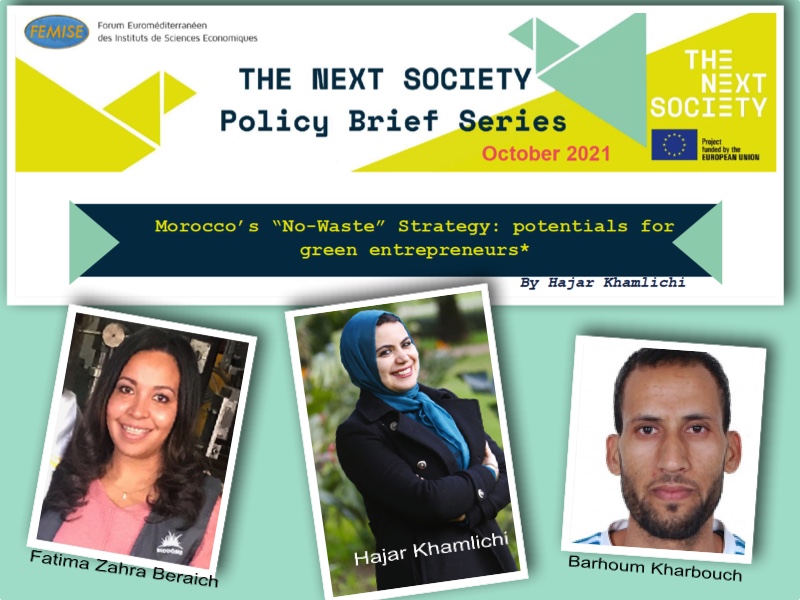 Micro, small and medium enterprises (MSMEs) constitute about 95% of total enterprises in the South Med region and are considered the driving forces of economic growth, job creation and green and inclusive growth. Entrepreneurs, particularity start-ups, still face numerous challenges when it comes to establishing, promoting and running their businesses. Providing them with support through innovative initiatives and enhancing the ecosystem where they operate will contribute to their development. In their turn, entrepreneurs will contribute to achieving several of the Sustainable Development Goals (SDGs).
Micro, small and medium enterprises (MSMEs) constitute about 95% of total enterprises in the South Med region and are considered the driving forces of economic growth, job creation and green and inclusive growth. Entrepreneurs, particularity start-ups, still face numerous challenges when it comes to establishing, promoting and running their businesses. Providing them with support through innovative initiatives and enhancing the ecosystem where they operate will contribute to their development. In their turn, entrepreneurs will contribute to achieving several of the Sustainable Development Goals (SDGs).
It is in this context that the Next Society (TNS) project and FEMISE decided to launch this initiative to produce “The Next Society Policy Briefs Series”. This series of briefs aims to better understand the challenges faced by entrepreneurs (through the lens of the entrepreneurs themselves) and to provide tailor-made operational policy recommendations. These briefs are based on collaborative work and exchange of knowledge and experience between the researcher(s)/author(s) and the entrepreneur(s), many of which have benefited from TNS project, ensuring their relevance and impact.
The fourth TNS/ FEMISE Policy Brief, entitled “Morocco’s “No-Waste” Strategy: potentials for green entrepreneurs” by Hajar Khamlichi, Mediterranean Youth Climate Network, is available here
 Summary:
Summary:
Morocco’s potential for climate entrepreneurship is high, and the country’s dynamic high-growth entrepreneurs are helping lead the country towards its green growth goals. According to the World Bank survey, Morocco represents a breeding ground for green entrepreneurship with a growing number of green start-ups. By scaling innovative business solutions to local climate challenges, green entrepreneurship will not only benefit Moroccans, but neighboring South Mediterranean and African countries as well.
The Moroccan government started to roll out several sustainability initiatives such as the National Roadmap for Energy Valorization of Biomass by 2030, National Energy Efficiency Strategy for 2030, Green hydrogen roadmap, Low Emission Development Strategy for 2050 (LEDS) and others. A new development model is also in process.
However, many challenges that relate to sustainable development still remain. One of them is waste management which represents in Morocco (as other developing countries) an important climate, social and economic challenge with almost 7 million tons of solid waste generated every year with an increase of 3% every year.
This brief aims to address Morocco’s green entrepreneurship ecosystem focusing on solid waste solutions, highlighting the opportunities and challenges of the waste management model and government efforts that are in place. Then it will analyze the potentials of green entrepreneurships in Morocco through the success stories of two start-ups that established their projects in waste management through finding green solutions to challenges in their communities. Through a survey conducted with these ‘green entrepreneurs’, they expressed the challenges they faced and how they have overcome these challenges.
Some of the main recommendations include creating strong policies and support to the green entrepreneurship ecosystem by deploying training programs dedicated to green professions and promoting research, development and innovation initiatives through appropriate incentive measures, carried by academic, industrial and financial players. As a result, this support would enhance the environment for green entrepreneurs and unlock the full potential of Morocco’s green private sector development agenda.
Watch this video by the author of the Brief and the entrepreneurs who are sharing their experiences, highlighting the challenges and providing recommendations and lessons learnt.
`*This Policy Brief and this Video are produced as part of the series of TNS/FEMISE Policy Briefs on “Entrepreneurship in South Mediterranean Countries” that is undertaken in partnership between FEMISE and ANIMA Investment Network.
![]() *”This policy brief and this Video have been produced with the financial support of the European Union. The contents of these products are the sole responsibility of the authors and entreprenerus and can under no circumstances be regarded as reflecting the position of the European Union.”
*”This policy brief and this Video have been produced with the financial support of the European Union. The contents of these products are the sole responsibility of the authors and entreprenerus and can under no circumstances be regarded as reflecting the position of the European Union.”


